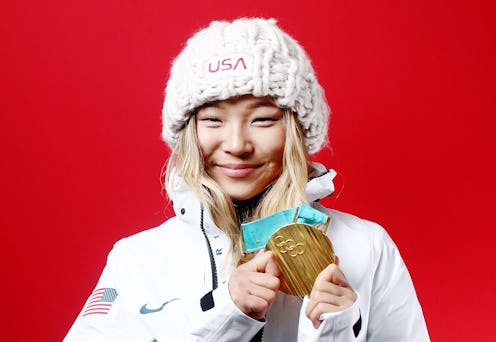Life
Here’s The Average Age Olympians Start Training For Their Sport

As the 2018 Winter Olympics are in full swing in PyeongChang, South Korea, the world has been captivated by the talented Olympians competing for their countries in every sport from figure skating to curling. Of course, the Olympians' spots in this year's Winter Games are well-earned — for most athletes competing, that talent captivating the world was built after years and years of training. In fact, for a large number of Olympic-level athletes, training to participate in the Olympic Games starts as early as childhood. Simone Biles? She was reportedly six years old when she began training to be a gymnast. Michael Phelps? He began training to be the Olympic swimmer he is when he was seven years old. And snowboarder Chloe Kim, who recently won gold in the 2018 Olympic Games for Team USA? She began snowboarding at four years old, and entered her first competition when she was six years old. But, is this common of all Olympic athletes? I mean, if Cool Runnings or Pita Taufatofua — the Tongan flag-bearer who, at 34 years old, apparently taught himself to ski in three months so he could compete in the 2018 Winter Games — have taught us anything, it's that if you begin to train as an adult and dedicate yourself, you can still make it to the games. So, it's worth asking: what is the average age that most Olympians start training?
As can be expected, the answer really varies depending on what sport we're talking about. For instance, gymnast Biles' training beginning at six years old is technically above the average age for gymnasts looking to compete in future Olympic Games, according Chron: As the site reported, when it comes to competing in gymnastics for Team USA, most athlete are beginning their training between the ages of two and five. It's during this time that it's determined whether a child may possess the skills for the sport. Once they hit the age of seven, they may start attending the Talent Opportunity Program, which scouts young gymnasts.
So, gymnastics is young — and if I, Tonya, the Margot Robbie-starring Tonya Harding biopic has told us anything, it's that most figure skaters begin training young too. But what about other sports like bobsledding, or Taufatofua's chosen 2018 Winter Olympics sport cross-country skiing? That's where things change. For instance, the Olympians who make up the bobsledding teams generally skew older than other athletes, and that's because they often don't start training until they're well into their 20s. Take the Nigerian women's bobsledding team who is competing in the 2018 Winter Games: the three women who make up the team are 31, 26, and 25, and according to TIME, they didn't start training until 2016. That's two years ago, when they were still in their 20s.
So, what does this all mean if we're talking about the average age an Olympian begins training to compete in the games?
If we're averaging this age range out to come up with an exact number for the average age an Olympian begins their training, it'll fall somewhere in the middle between a sport like gymnastics and a sport like bobsledding — in other words, the average age would be somewhere in the mid-teens. That said, the Olympics (of course) do have age requirements for their athletes: While there is no maximum age to compete, the minimum age is 16 years old. Additionally, Livestrong reported that if an athlete is turning 16 years old within the calendar year but is not that age at the time of the Olympic Games, then they are still eligible to compete as well. So, even if an athlete begins training at two years old, they won't actually be able to participate in the games until they're a teenager.
Of course, there will always be exceptions to the average age of training, but that's just what they are — exceptions. The bottom line is, training to compete in the games is difficult and time-consuming to take on, and dedication — sometimes an entire childhood of it — is key in order to compete for Olympic Gold.
But hey, you know how the saying goes: Nothing worth having comes easy.